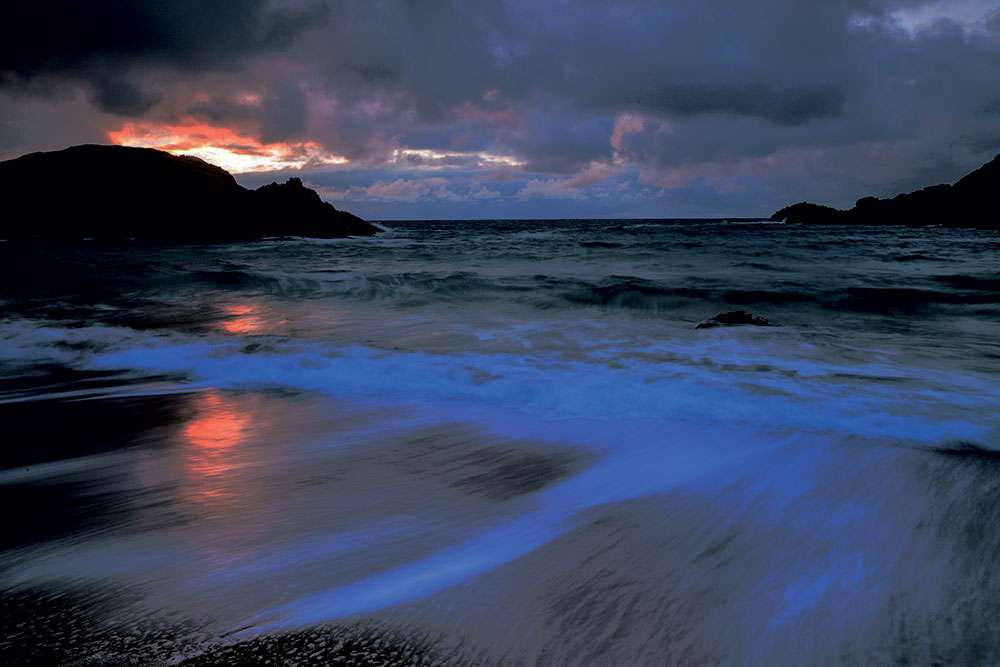
I was born and bred in Cranleigh and lived there for nearly 26 years with my parents and three sisters. Initially I went to Cranleigh Infant school then Park Mead, followed by Glebelands. I was at Cranleigh School for 6th form. I loved school, being a bit of a cheeky chappie but worked hard and did pretty well.
There were a couple of memorable teachers during my education who made an impact on me. For example, Mr Coward, who was head of my year and influenced me a great deal. He was a sports teacher and it was him who inspired me to become a PE teacher. I probably owe a lot to him. I can’t remember anything he said in particular, but he was just a good, honest man who gave good advice and was always there to chat to. Then there was Mr Haviland, who was head of RE and an all-round, helpful teacher. He was a very inspiring character who also had quite an impact on me when I was at school.
Growing up in Cranleigh was great! I loved the village and played for Cranleigh Rugby Club for many years. I went to school with many of the Rugby guys and those childhood friendships have become lifelong.
I am very fortunate that I have some great friends from my school days and still keep in touch with people from Glebelands and Cranleigh School. I think that sport for me cemented those relationships more than others because you go through a lot together on the field. You end up socialising afterwards – commiserating losses and celebrating achievements together. Those friends have all shaped my life and who I have become.
After I finished university I started teaching at a local school called *Grafham Grange. It’s a school for children with emotional and behavioural problems. I met some great people while working there though it was a really challenging environment to learn how to teach in. While there I became really passionate about helping children with special needs. Following a job as a PE teacher in another special needs school, I’m now working as Deputy Head at **New Barn School in Broadbridge Heath. I work with kids who suffer from high functioning autism and behavioural difficulties. I can’t see myself doing anything else at the moment. I get some difficult days but it is very rewarding.

Survival Food and Equipment
I love being active and sport in particular. I’ve recently moved away from team-based sports such as rugby because I’ve suffered a few injuries over the years. As a result, I’ve become really interested in individual pursuits and long distance ultra-endurance activities.
I quite enjoy the endurance-based challenges because I am actually not very good at them! It’s by pushing myself and training that I get to the point where I can do an ultra- endurance swim for example. It doesn’t come easy to me which is why I love it.
I have never been content and that’s not a bad thing, I’m just always trying to push myself in a very positive way. I don’t want to be “satisfied”. For me, if you become satisfied, you stop growing emotionally and stop really living. Whether it’s work or helping others, whatever you might be passionate about, you should never settle for anything less.
I really look up to my parents as obvious role models – they have done big things with their lives. As well as the teachers that I mentioned, I have been motivated by sports stars like Johnny Wilkinson – not just for his rugby ability but for his attitude to self-improvement and wanting to be the best he can be. That is the sort of dedication I really admire.
My grandad was a hugely talented sportsman, and he taught me many things when I was growing up. He was a featherweight champion in the army I believe, and even as an older man, late into his 70’s and 80’s, he would play darts and bowls at the British Legion in Cranleigh (and win!).
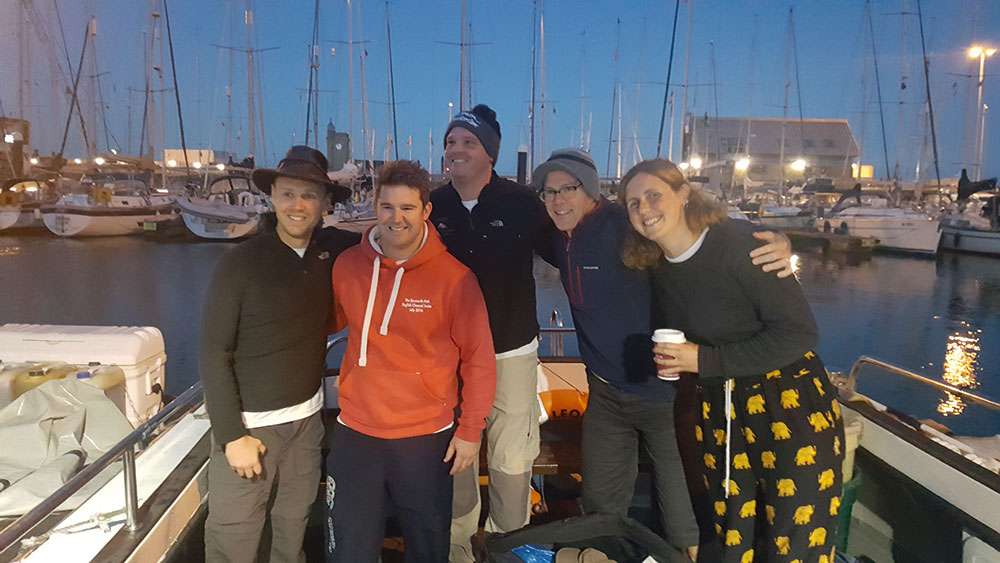
Ready to go!
Some years ago I suffered an injury on a bike ride from John O’ Groats to Lands End. During my solo attempt to ride there, with my tent and equipment on my back, I fell off my bike injuring my ankle which wasn’t ideal as I was on my own.
I had managed to cycle the length of Scotland over the Nevis range, through the Lake District and on to Birmingham when I had this unfortunate accident. As a result, the incident stopped me from cycling and running for quite a long time. I became unfit and put on weight before I thought, “Right, it’s time to do something, I feel ready”. After starting a new job which gave me a better work/life balance, I was coming up to my 30th birthday and decided that I wanted to do something extraordinary.
I had heard about swimming challenges before and thought that I’d take a wetsuit down to Thorpe Park Lake and give it a go. I’d been swimming as a kid and knew how to swim but I am somewhat of an average swimmer. I swam 400m in the lake and was ‘cooked’ for the day. However, my experimental swim sparked a switch in my head that went off in a big way and I went home to research big swims. During my research, I found an ultra-endurance swim of the Channel, an equivalent of 4-5 back to back marathon swims. I was unsure but rang a friend of mine who put me in touch with a Channel swimming club down in Bournemouth, where I started to train from June 2016.
I trained in sprint sets, swimming 100m, enjoying a 5 second break, then 100m, another 5 second break, and so on until I’d swum 10km. My technique massively improved due to lots of coaching. The trick is to swim as slow as possible to preserve energy, but at the same time as powerfully as you possibly can and for a long period of time.
I started swimming in the sea in April – when the sea was about 9oC – to get used to the cold water, because before that I’d swum in a nice hot pool during the winter. We swam about 2-3 times a week, and every weekend in the summer months we would swim in the sea along the beach. I remember in the first summer I got up to a 5-hour swim which was pretty good as it was ahead of schedule. The general rule is once you have done a 7-hour swim on a Saturday and a 6-hour swim on a Sunday, back to back, two weekends in succession you are ready!
In order to actually do the swim, you’re allocated a week’s window where you can set off anytime depending on the tides and weather. There are three slots with three swimmers booked each week. If it’s washout weather then you join the waiting list.
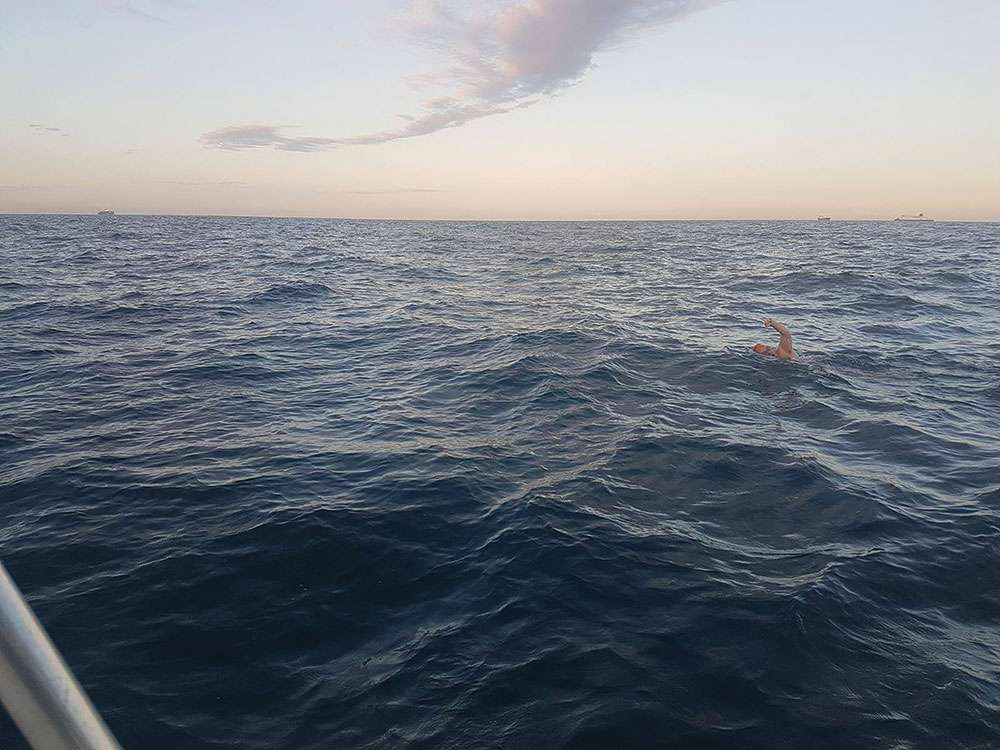
Off we go!
I received my window of opportunity between 29th July and 7th August – the weather was awful. The guy who had the first slot on the same boat was a good friend of mine who I had trained with. He successfully completed the swim on the second day of the window which really encouraged me as we were similar standard of swimmers.
I had to wait right until the last day to do my swim. Their was thunder and lightening in Cranleigh when I got the call to say there was an opening at 11pm that night, if I was able to get down to Dover for 9pm. The weather was so bad as I was driving down, I was unsure if it was going to be ‘do-able’. But with the possibility whirling round in my head of the chance to do it slipping away, I was determined to take this final opportunity.
I thought “this is it”. At the heart of it, swimming the Channel can be a dangerous thing. You and the crew have to know your body very well and the way that you swim. The crew will count your stroke rate every hour and if it drops to 20% lower than your average, they cut the swim off. Standing on the beach, about to enter, I put my faith in a higher being and began to swim.
The first couple of hours were pretty cold but I was in really good shape and I was strangely enjoying it because I had never swum in the dark before. You have a green light on your back so that the boat can see you, and then another light on the boat so that you can see the boat. Apart from that, you can’t see anything except from the odd jellyfish because they react with the light. There are some big ones out there and when they float beside you, it’s pretty scary because you have no wetsuit for protection.
I was fed a carbohydrate drink full of powder, a couple of jelly babies and carried on. After about four hours I started to get really bad cramp which lasted a full 5 hours before the sun came up which was especially tough. I also started to notice the cold a bit more – both in the water and the air around me that I was breathing and started simultaneously shaking as I swam.
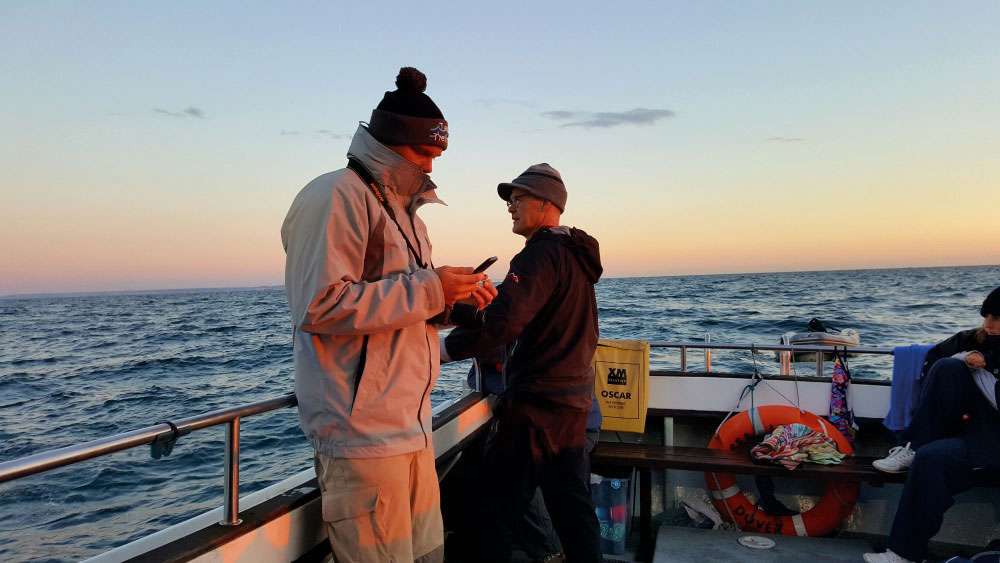
The Crew on the boat beside Dan.
There were a few things I had in my toolkit that I could bring out when I needed them. I do simply love swimming, however when it got tough, I thought of my grandad. He crossed the Channel during World War II on D-Day, making almost exactly the same crossing that I was completing at that moment. My grandad sadly passed away a few years ago, but I felt his presence and his energy with me while I was in the water. I thought about what he went through, going to war and leaving his family behind and it motivated and inspired me. If he could cross the channel on the war ships, in his tank to fight in the war, alongside thousands of brave soldiers then I could do this. No matter how painful it got, or how long it lasted, I knew that the pain would eventually stop and I would always be a Channel swimmer.
As well as encouragement from friends and family, I had a big group on WhatsApp who were following me, and I knew they would be going crazy on it. My crew read out their messages to me from the boat to keep me going and cheer me on.
I had mentally prepared myself for a jellyfish sting as I had been stung once before in training and knew what it felt like. You’re very lucky if you don’t get stung during the swim. I thought “How am I going to deal with this, especially if I get multiple stings?”
Being a big believer in energy and transferring positive energy, I decided to think about it as a positive rather than pain. I thought “If I’m stung, I can use that electric energy to power myself through”. As it happened I was stung twice during the night and four times during a single half hour on my knee, bicep, and back.
It’s a glorious moment as you realise the end is in sight. One, because sunrises are beautiful, and two, because it meant that I might stop shivering soon! I was about 7-8 hours in and over half way when the sun started to warm me and I remember feeling happy because I was going to finish in the daytime. I could also see the crew members a bit more so I was able to interact with them every half hour when I was fed. I would still try to crack jokes through the pain – I didn’t want them to think I was struggling. I had a few people I knew with me: James Kiernan and Ben West – my two friends from Cranleigh, and Stewart who had swam the channel the year before. I had been on his crew for his swim and he gave me lots of tips. I also had a support swimmer called Naomi. Naomi swam for an hour at a time with a break of two hours in between. She helped give me that extra kick. It’s nice to have someone in the water beside you so you’re not swimming alone.
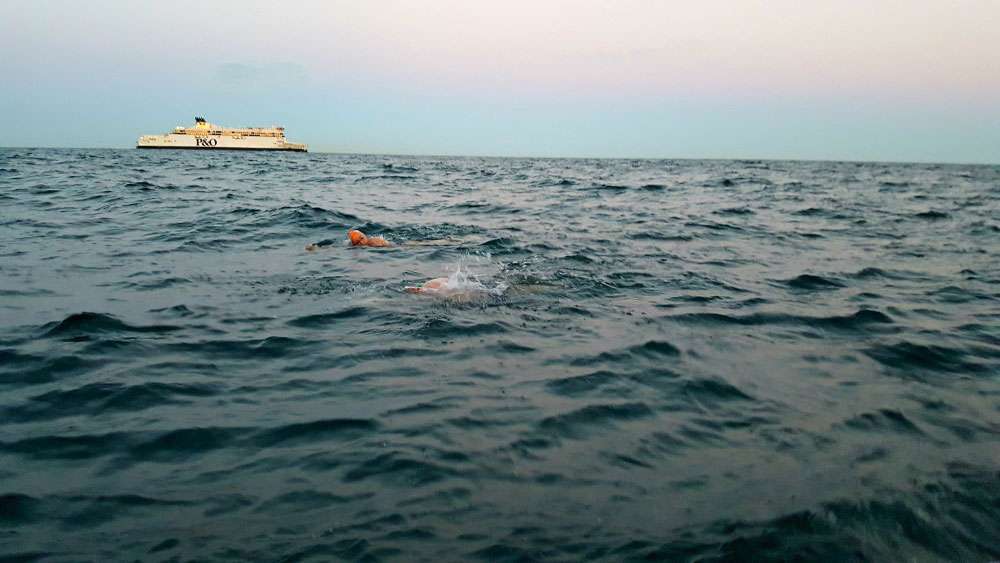
Dan with his support swimmer, Naomi
Land was getting nearer and nearer, but swimming was getting harder because I was growing more and more tired. In the last three hours I was in a lot of pain and I was trying to deal with it and respond positively.
I missed the Cap Gris-Nez – which is the point I was supposed to be aiming for – because the tide was pushing me north. Missing this added a couple of hours onto the swim which was devastating. The weather was starting to pick up; the water was getting choppier, and I was starting to hallucinate a little from fatigue. I could clearly see France two hours from finishing which was both encouraging and demoralising as it was so close yet still quite far.
The one thing that all Channel swimmers will tell you is the big pilot boat that follows you across, can’t go into shore and they have to anchor themselves a distance out because it gets too shallow. Instead, they send a dingy boat with a little motor that you then follow instead when you’re about 40 minutes away. It was at this point my crew told me they’d give me my last feed before shore – a Coca Cola as I was feeling a bit sick from the carbohydrate drink and a mini roll that I kind of just smeared across my face – which made them laugh!
Once I got to the edge, I saw one of my best friends who had got a ferry over to surprise me on the beach. My initial thoughts were that he wasn’t real, because my perception was so shaky. I was a bit dizzy when I stood up and the slippery rocks proved too much for me so I went down again. You’ve got to be careful about taking it slow after you’ve been horizontal for 14 hours and 4 minutes (exactly!) and you stand up suddenly. My friend had bought a celebratory bottle of champagne that he proceeded to spray all over me before I was allowed a glass.
I picked up my “channel pebble” – you don’t receive a medal or a trophy or anything, so it’s customary to put a French pebble in your pocket for when they drag you back to the dingy boat and back to England. I had a beer on the way home and then just fell asleep.
Once is enough! I learnt that it’s not just the swim, it’s the training that you do to get there. Everyone always talks about the swim which is great but people don’t see you go to work from 7am -7pm during the day and then instead of going home, driving to the pool to swim for three hours before coming home for dinner at 10:30pm and going to bed near midnight. At the weekend it’s then a drive down to Bournemouth to swim for 7 hours, before driving back and doing the same on Sunday. That’s what I’m taking away from it – I’m just an average swimmer at best, but with a bit of hard work and determination you can do anything you want.
My ambition is to swim the Channel when I am 40, and then once every decade until I am 70. In between these? I’m not too sure what the future holds but you can be sure that there will be something. See you again in ten years’ time and I will tell you how the second one has gone!
I decided to dedicate sponsorships for the swim to a charity called ***Aspire who help people that suffer from spinal injuries – a very worthwhile charity that do a lot of swims themselves.

Made it at last!
*Grafham Grange School caters for students between the ages of 10 to 16 all of whom have a statement of special educational needs and/or EHC Plan. Students have a complex range of difficulties including autistic spectrum conditions, speech, language and communication difficulties, ADHD, opposition defiance, medical conditions and attachment disorders.
**New Barn School is a brand new school for special needs education. The school offers brand new facilities set in the beautiful countryside. The staff team at New Barn School are committed to creating a learning environment that offers the best possible outcomes for its pupils. The aim of their curriculum is to encourage pupils both academically and socially so they can make accelerated progress. At New Barn School, they place a strong emphasis on personal development. Setting high expectations of their pupils and believing that by developing self-confidence, self-esteem and independence, pupils will gain high expectations of themselves.
***Aspire provides help to people who have been paralysed by Spinal Cord Injuries, supporting them from injury to independence. To support Aspire you can swim the distance of the English Channel for charity and raise money for people paralysed by Spinal Cord Injury.











